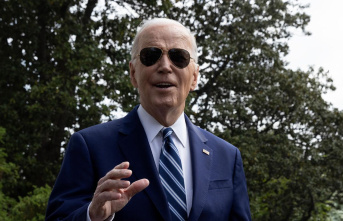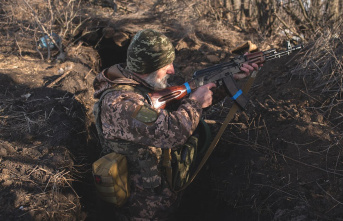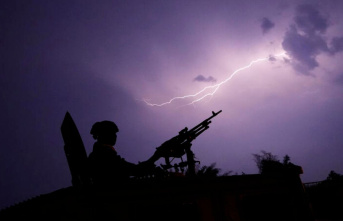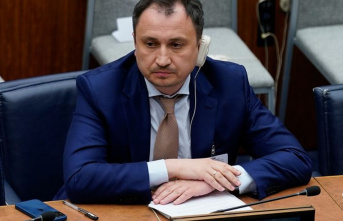Thousands of people took to the streets in Iran after the death of a young woman. At least six people were killed in the nationwide protests on Wednesday, according to Iranian media. Among them are at least one police officer and five other participants in the protests. The exact circumstances could not initially be checked.
US President Joe Biden pledged his support to the demonstrators in his speech at the general debate at the UN General Assembly in New York. "Today we stand with the courageous citizens and courageous women of Iran who are demonstrating at this time to secure their basic rights." Iran's President Ebrahim Raisi had previously spoken at the event and accused the West of double standards in human rights. The West is taking a stand on a case in Iran that is still under investigation, but is silent "about the murder of dozens of women" in another country, Raisi said. He didn't go into details.
Vice police arrested Amini
The demonstrations were triggered by the death of 22-year-old Mahsa Amini. She was arrested by the vice squad a week ago because of her "un-Islamic outfit". What exactly happened to Amini after her arrest is unclear, but she fell into a coma and died in a hospital on Friday. Critics accuse the morality police of using violence. The police firmly deny the allegations.
In numerous cities, people poured into the streets. In addition to slogans critical of the government, more and more people shouted: "We're fighting, we're dying, we're going to take Iran back." Even in the arch-conservative city and the Shiite center of Qom, young people demonstrated against the Islamic dress codes.
Protests were also reported on the holiday island of Kish in the Persian Gulf, which is considered to be particularly quiet. Videos on social media, the authenticity of which could not be verified, showed demonstrators beating security forces or women setting their headscarves on fire. The governor of the Iranian province of Kurdistan reported three dead demonstrators on Tuesday.
Also in Kermanshah in central Iran, two people died under "suspicious" circumstances. In both cases, however, the authorities rejected the intervention of security forces. In neighboring Turkey, Iranians gathered in front of the Iranian consulate general in Istanbul on Wednesday and protested in solidarity with their compatriots.
The internet was massively restricted as a result of the nationwide protests. Mobile networks are "largely switched off," reported the organization Netblocks. With the strictest restrictions since the November 2019 protests, Instagram was also one of the last free social networks to be blocked. Experts fear that the police and security forces could now put down the demonstrations.
Criticism even from Ayatollah Khomeini's grandson
Meanwhile, voices were increasing calling for the strict dress code to be relaxed and for the government to change course. "A law that the majority of society does not follow must be revised," said former mayor of the capital Tehran, Gholam Hussein Karbaschi. Former President Mohammed Chatami had also expressed criticism. Even the grandson of the founder of the revolution, Ayatollah Ruhollah Khomeini, expressed criticism and called for a thorough investigation.
According to experts from Tehran, the strict dress code is one of the ideological principles of the Islamic Republic. Supporters of the system fear a domino effect should the state make major concessions to women in their choice of clothing. The conservative newspaper Keyhan accused the reformers of using Amini's death for political purposes.
Iran has had strict dress codes since the Islamic Revolution in 1979. In the big cities in particular, many women now see the rules as rather relaxed and, for example, only wear their headscarves on the back of their heads - to the annoyance of ultra-conservative politicians. Religious hardliners in parliament have been trying for months to have Islamic laws applied more strictly.
Solidarity also in Turkey
In the Turkish metropolis of Istanbul, numerous demonstrators gathered in front of the Iranian Consulate General after Amini's death became known. "The 22-year-old Iranian, Mahsa Amini, lost her life after being beaten by the police. What did she do? She didn't completely cover her hair," read the poster of a participant in the demonstration in the Fatih district. "Turkey, Turkey, thank you," shouted some of the demonstrators, thanking the Turkish authorities for allowing the protest.
"The morality police murdered a young woman for not wearing her hijab (Islamic head covering) properly. The morality police are a nightmare for all women (...). You can be summoned to court for not wearing the hijab properly," said a 32-year-old participant from the German Press Agency. That's why she left Iran a year ago.












